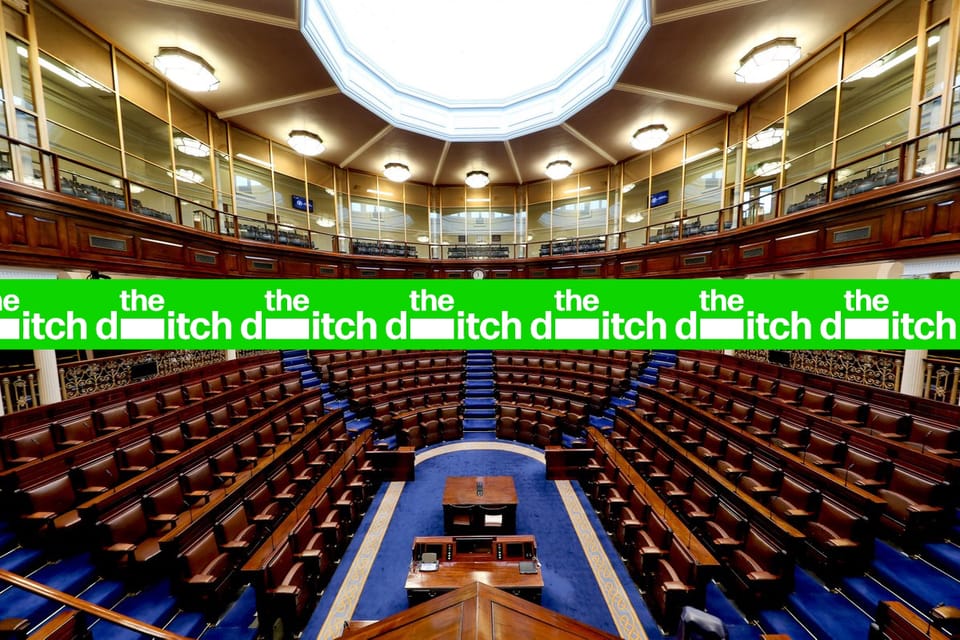Israel's Ministry of Justice said it was told “through various channels” that Ireland’s Fianna Fáil ceann comhairle would have a “decisive role” in the potential passage of the Occupied Territories Bill.
Israel wanted the Irish government to invoke a money message under article 17.2 of the constitution – a mechanism critics say government uses to frustrate the passage of legislation – to block the Occupied Territories Bill.
Its Ministry of Justice representatives were concerned that ceann comhairle Seán Ó Fearghaíl’s party affiliation meant he wouldn’t approve its use, according to leaked emails reviewed by The Ditch.
Yesterday The Ditch reported then finance minister Paschal Donohoe had a “confidential call” with his Israeli counterpart where the Fine Gael TD reportedly, according to leaked internal correspondence, assured Israel’s finance minister that Ireland’s government would “block” the Occupied Territories Bill.
A spokesperson for Donohoe however said,“A call of this nature never took place.” The spokesperson also said, “We have nothing further to add.”
Tánaiste Micheál Martin, responding to what he read on The Ditch, said, “I think Paschal Donohoe can't recall it,” referring to the phone call, adding that “engagement with Israel to present the Irish position is ‘not unusual’”, according to Newstalk.
Sinn Féin foreign affairs spokesperson Matt Carthy meanwhile has called on Donohoe and government as a whole to account for their interactions with Israeli officials. “Paschal Donohoe must set out clearly the detail of his engagements with Israeli counterparts. Indeed all government departments must immediately set out the details of any contact ministers have had with Israeli ministers or government officials over the past decade,” he said.
‘Through various channels’
Fianna Fáil junior minister Niall Collins introduced the Occupied Territories Bill to the Dáil on 23 January, 2019. Presenting the bill Collins said, “If passed Ireland and her parliament will be sending a strong message that it condemns the occupation of territories which are deemed illegal under international law.”
The bill concerned Israel. It had hired Dublin law firm McCann FitzGerald to advise on the potential for the bill to pass.
In internal correspondence Israeli Ministry of Justice officials had discussed whether government would use the money message mechanism to slow the bill’s progress.
In a 28 January, 2019 email to a McCann Fitzgerald lawyer, Hadie Cohen – an Israeli Ministry of Justice official – spoke about how Israel had been told government might use the process.
“We presume that the government needs to make a formal announcement to this effect (beyond its statements during the debate) – please can you let us know if this step has been taken,” she wrote.
Cohen went on to say Israel was concerned that ceann comhairle Seán Ó Fearghaíl would have the final say on whether the money message was used.
“At paragraph 8.2(e)(v) of your memo you explain that in the event of a disagreement as to whether the bill can properly be characterised as a ‘money bill’, it seems that the bills office of the houses of the Oireachtas would determine whether the bill is in fact a "money bill". In your email from Thursday morning you speculated that thereafter the matter might be ruled on by the ceann comhairle. We noticed that you did not mention this possibility in your formal note and would be grateful if you could clarify your reasoning for the change,” she wrote.
Cohen said that Israel had been told – “through various channels” – that Ó Fearghaíl could be influential.
“The reason for this question is that it has been expressed to us through various channels that the ceann comhairle would have a decisive role in determining whether the bill will ultimately be characterised as a money bill,” she wrote.
Ó Fearghaíl’s membership of Fianna Fáil was a concern.
“Given that he is a member of Fianna Fáil, we would like to understand what law, regulation or policy these speculations are based on, and what your view is as to the likelihood that the ceann comhairle will ultimately hold the power to determine whether the bill is a money bill or not. We note, from your memo, that on a casting vote the speaker is bound, by convention, to vote with the government. Would the same convention apply to the speaker's consideration of this issue?” wrote Cohen.
Distributed Denial of Secrets first made this correspondence public. Files it’s made public, originally obtained by hacktivist group Anonymous for Justice, have recently been reported on by The Guardian.


